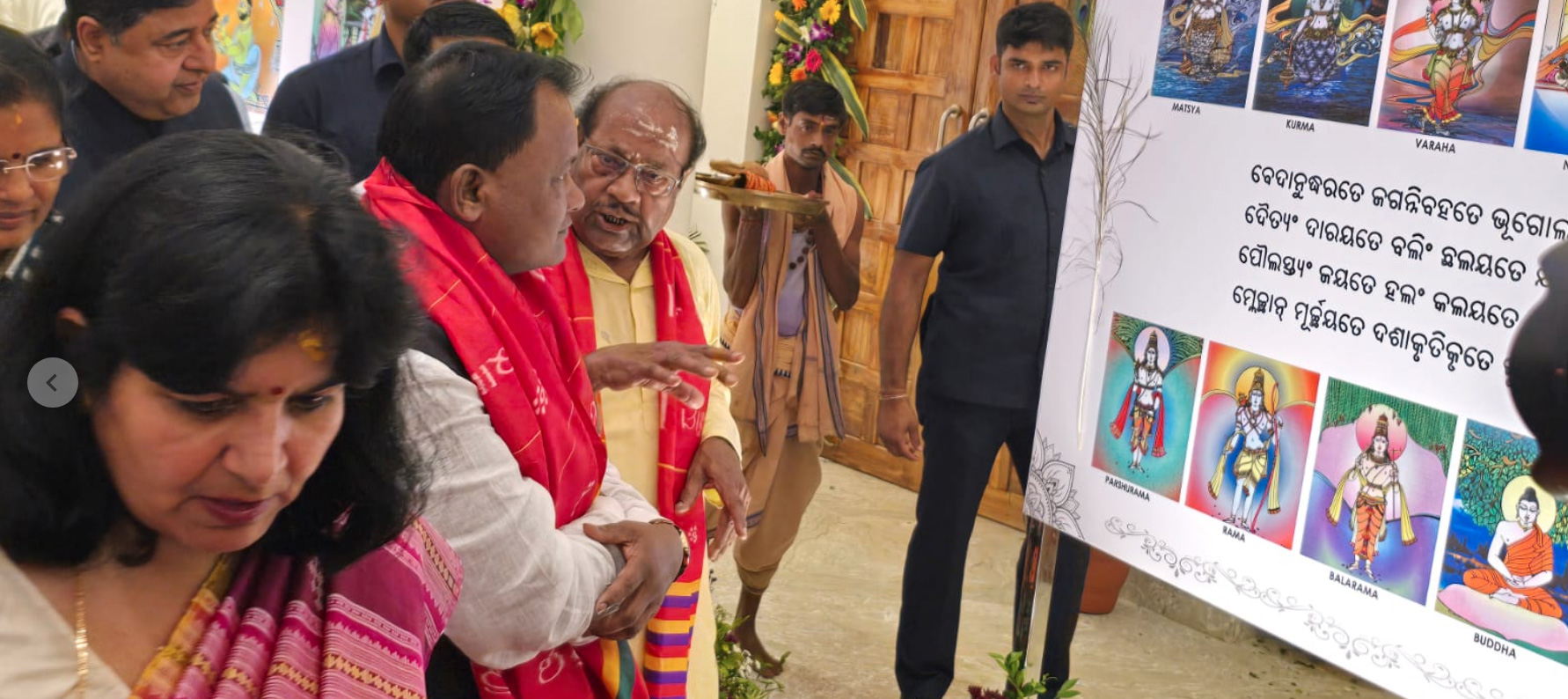Bhubaneswar: During a recent visit to Jayadev Pitha in Kenduli, the birthplace of the revered saint-poet Jayadev, Chief Minister Mohan Charan Majhi received an insightful presentation from Gadadhar Mahapatra, a Distinguished Authority on Jayadev and his iconic work, the Gita Govinda.
The Chief Minister’s visit underscored the rich cultural and spiritual heritage of Odisha and the timeless relevance of Jayadev’s contributions. Deputy Chief Minister Pravati Parida, MP Bhubaneswar, Aparajita Sarangi, Principal Secretary Odia Language, Literature and Culture, Sanjeeb Kumar Mishra, Principal Secretary Information & Public Relations Sanjay Kumar Singh, Secreatry Tourism, Balwant Singh were present during the presentation of Jayadev and Gita Govinda.
Shri Mahapatra eloquently described the Gita Govinda as a “unique Gita-Kabya” (lyrical poem) composed in the twelfth century. He highlighted that Jayadev, born to Bhojadev and Ramadevi in Kendubilva (modern-day Kenduli), a village nestled in the culturally vibrant Prachi Valley renowned for its Madhava worship, infused his masterpiece with profound spiritual significance.
Krishna, or Madhava, is presented as the central heroic figure of the Gita Govinda, a deity deeply rooted in the region, as evidenced by the surrounding villages named after the Dasavatara (ten incarnations) of Vishnu.
The Gita Govinda, Shri Mahapatra explained, is a sublime depiction of the mystical love, separation, longing, and eventual union of Radha and Krishna. This cosmic duo, he emphasized, metaphysically symbolizes the interplay between Jivatma (the individual soul) and Paramatma (the supreme soul). Its spiritual essence, mystical imports, sensual overtones, aesthetic depictions, and lyrical fluidity have, over centuries, captivated critics, enlightened scholars, mystified saints, charmed lovers, deeply involved devotees, and emotionally and sentimentally touched people at large.
Shri Mahapatra further elaborated on the groundbreaking aspects of the Gita Govinda:
Pioneering Lyrical Dance Drama: It stands as the first lyrical dance drama (Gitakavya) composed in simplified Sanskrit, thoughtfully incorporating vernacular idioms to ensure its accessibility and appreciation by a wider audience, a stark contrast to more classical Sanskrit literature of the time. Historically, it was enacted as a play with deep spiritual fervor within temple precincts during religious ceremonies.
The lyrics, characterized by their “Madhura, Komala, Kanta, Padavali” (sweet, soft, and soothing quality), are meticulously set to melodious Raga and Chhanda. Rich metaphors and rhythmic alliteration permeate the composition, touching the heart and soul. The stimulating and penetrating diction readily evokes emotions, so much so that people often sing the songs with profound feeling, even without fully comprehending the underlying theme.
Radha’s Elevated Status: For the first time in such a prominent text, Jayadev characterized Radha as the eternal consort of Krishna and his power of bliss (ananda shakti). This innovative portrayal, rooted in the doctrine of Nimbarka, fundamentally altered the Vaishnavite devotional landscape. It paved the way for the widespread worship of the Radha-Krishna duo as beloved deities, shifting the focus from the four-handed Vishnu, holding Sankha, Chakra, Gada, and Padma (conch, disc, mace, and lotus), standing alone or with Lakshmi, to the two-handed Krishna, holding his flute, accompanied in the embrace posture of Radha.
Revolutionizing Bhakti through Prema: Jayadev’s Gita Govinda revolutionized the concept of Bhakti (devotion), as propounded by Vedantin Vaishnavites like Ramanuja, Madhavacharya, and Vallabhacharya. He introduced the crucial element of Prema (Love) as the ultimate means for communion with God and to attain eternal bliss (ananda). This emphasis on passionate, loving devotion transformed the spiritual path, offering a more intimate and emotionally resonant connection with the divine.
Chief Minister Shri Majhi’s engagement with Shri Mahapatra’s insights at Jayadev Pitha served as a powerful reminder of the profound impact of Jayadev’s Gita Govinda on India’s spiritual, cultural, and artistic landscape, highlighting its enduring message of divine love and the pursuit of ultimate bliss.
A highly religious and pious personality Chief Minister Shri Majhi was happy listening Gita Govinda, said a senior officer of the Department of Odia Language Literature and Culture


